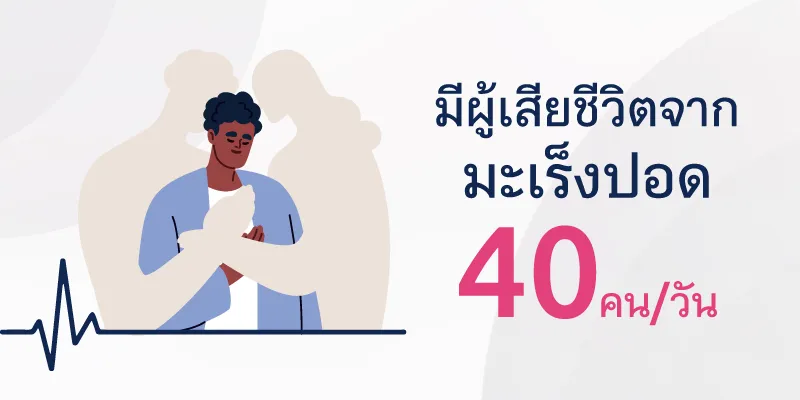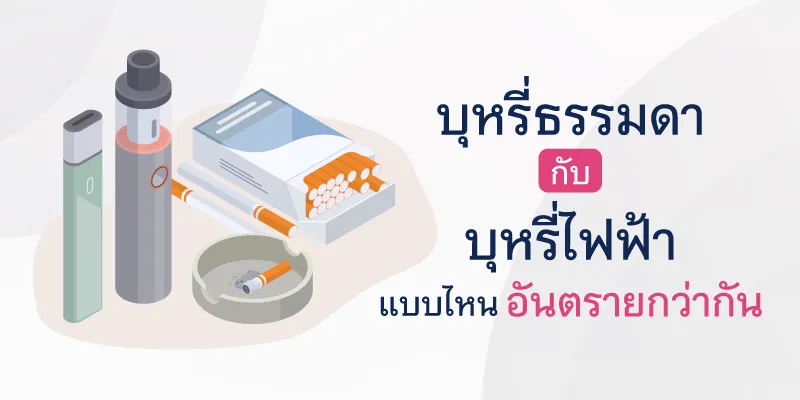มะเร็งปอด…ไม่สูบก็เสี่ยง
สูบบุหรี่วันละมวน อายุสั้นลงได้! โดยเฉพาะคนอายุน้อยที่โหมงานหนัก เที่ยวบ่อย ปาร์ตี้เก่ง และมีพฤติกรรมชอบสูบบุหรี่ หรือได้รับควันบุหรี่มือสองจากแหล่งต่าง ๆ อาจเสี่ยงเป็นมะเร็งปอดได้ ซึ่งมะเร็งปอดถือได้ว่าเป็น 1 ใน 5 มะเร็งที่พบบ่อยที่สุด
โดยในปัจจุบันสามารถพบได้ในคนอายุน้อยกว่า 40 ปี ซึ่งเป็นเรื่องที่น่ากังวลสำหรับเหล่าคนเจนใหม่ เพราะหากร่างกายสะสมควันบุหรี่ไว้เป็นเวลานานอาจลุกลามกลายเป็นมะเร็งในที่สุด วันนี้เมืองไทยประกันชีวิตจะพามาทำความรู้จักกับบุหรี่…หนึ่งในตัวร้ายโรคมะเร็งปอด และอันตรายจากบุหรี่ไฟฟ้าจะมีความเสี่ยงต่อสุขภาพมากน้อยแค่ไหนมาดูกัน

มีผู้เสียชีวิตจาก มะเร็งปอด 40 คน/วัน
ปัจจุบันประเทศไทยมีผู้ป่วยเป็นโรคมะเร็งรายใหม่ถึง 47 คนต่อวัน หรือ 17,222 คนต่อปี มีผู้เสียชีวิตเฉลี่ยประมาณ 40 คนต่อวัน โดยโรคมะเร็งปอดเป็นมะเร็งที่พบมากเป็นอันดับ 2 ในผู้ชาย และอันดับ 5 ในผู้หญิง ซึ่งผู้สูบบุหรี่จะมีความเสี่ยงเป็นมะเร็งปอดสูงถึง 10-30 เท่า เพราะสารในบุหรี่สามารถทำลายเซลล์ปอด ทำให้เกิดความผิดปกติของเซลล์ โดยความเสี่ยงจะเพิ่มขึ้นตามจำนวนมวนและจำนวนปีที่สูบบุหรี่ แต่สำหรับผู้ที่ไม่สูบก็อย่าวางใจแม้สุขภาพจะแข็งแรงและไม่มีปัจจัยเสี่ยง ก็สามารถสัมผัสสารก่อมะเร็งได้จากควันบุหรี่ รวมถึงบุหรี่มือสอง และสารพิษจากบุหรี่ที่ตกค้างตามพื้นถนน โต๊ะ เก้าอี้ หรือบนพื้นผิวต่าง ๆ ได้เช่นกัน
นอกจากนี้การได้รับสารพิษและมลภาวะในสิ่งแวดล้อม เช่น ก๊าซเรดอน แร่ใยหิน รังสี ควันธูป ควันจากท่อไอเสีย และมลภาวะทางอากาศ รวมถึงฝุ่น PM2.5 เมื่อสูดดมเข้าไปโดยตรงทำให้เกิดการอักเสบต่าง ๆ ในทางเดินหายใจขึ้น ซึ่งอาจเสี่ยงกับการเกิดโรคมะเร็งปอดได้เช่นกัน

บุหรี่ธรรมดา กับ บุหรี่ไฟฟ้า แบบไหนอันตรายกว่ากัน
จากข้อมูลพบว่า บุหรี่ธรรมดากับบุหรี่ไฟฟ้าอันตรายต่อสุขภาพไม่แตกต่างกัน โดยบุหรี่ไฟฟ้า สามารถทำลายดีเอ็นเอ เพิ่มความเสี่ยงมะเร็งเทียบเท่าบุหรี่ธรรมดา
บุหรี่ไฟฟ้าใช้กลไกไฟฟ้าทำให้เกิดความร้อนและไอน้ำที่มีนิโคติน ซึ่งเป็นสารที่ทำให้เกิดการเสพติดได้เช่นเดียวกันกับบุหรี่ธรรมดา ส่งผลให้เลือดไปเลี้ยงส่วนต่าง ๆ ของร่างกายน้อยลง รวมถึงในบุหรี่ไฟฟ้ายังมีสารมีพิษอื่น ๆ ที่เป็นอันตรายทำให้ไอ ระคายเคืองปอด เพิ่มความเสี่ยงอาการหอบหืด เสี่ยงเป็นโรคหัวใจ โรคหลอดเลือดสมอง และโรคปอดอักเสบเฉียบพลัน
ส่วนบุหรี่ธรรมดามีสารเคมีและสารพิษรวมกันมากกว่า 4,000 ชนิด รวมถึงมีสารก่อมะเร็งอีกมากกว่า 60 ชนิด เสี่ยงต่อโรคร้าย เช่น มะเร็ง ถุงลมโป่งพอง ปอดบวม โรคหัวใจและหลอดเลือด รวมถึงโรคเบาหวาน

อยากเลิกบุหรี่ ควรทำอย่างไร
อย่างที่ทราบกันดีถึงอันตรายต่อสุขภาพจากบุหรี่ธรรมดาหรือบุหรี่ไฟฟ้าว่าสามารถเพิ่มความเสี่ยงการเกิดปัญหาสุขภาพกับผู้สูบได้โดยตรง รวมถึงส่งผลกระทบต่อผู้อยู่รอบตัว ดังนั้นการเริ่มต้นลดละเลิกบุหรี่จะไม่ใช่แค่เพื่อตัวคุณเองเท่านั้น แต่เพื่อผู้คนใกล้ชิดและสังคมรอบตัวที่อาจถูกผลกระทบจากควันบุหรี่ โดยเราสามารถเริ่มต้นเลิกบุหรี่ด้วยวิธีต่อไปนี้
- มองหาแรงจูงใจที่ดี เช่น เพื่อให้มีสุขภาพที่ดีขึ้น อยู่กับคนที่รักไปได้นาน ๆ
- เลือกวันที่เหมาะสมในการเลิกบุหรี่ เช่น วันขึ้นปีใหม่ วันเกิด หรือวันสำคัญอื่น ๆ ในชีวิต
- ค่อย ๆ ลดปริมาณลง หรือหักดิบ แล้วแต่ความเหมาะสมของแต่ละคน
- หาตัวช่วยในการลดบุหรี่ เช่น นิโคตินทดแทน ยาเลิกบุหรี่ ตามคำแนะนำของแพทย์
- หลีกเลี่ยงปัจจัยที่กระตุ้นให้อยากสูบ ทิ้งไฟแช็กและบุหรี่ งดเว้นพฤติกรรมที่ทำให้อยากกลับมาสูบบุหรี่อีกครั้ง
จุดเริ่มต้นของโรคร้ายอันดับต้น ๆ อย่างมะเร็งปอด นอกเหนือจากบุหรี่ที่เป็นตัวการสำคัญแล้ว ความเสี่ยงจากอากาศ มลภาวะต่าง ๆ รวมถึงฝุ่น PM2.5 ก็ช่วยเพิ่มความเสี่ยงให้เป็นโรคมะเร็งปอดได้ง่าย ๆ และยิ่งตอนนี้สุขภาพก็ไม่ได้สัมพันธ์กับอายุอีกต่อไป คนอายุน้อยก็สามารถเจ็บป่วยได้ และการมีประกันสุขภาพไว้ก่อนป่วยก็ช่วยลดความเสี่ยงเรื่องค่ารักษายามเจ็บป่วยได้ พร้อมเพิ่มความมั่นใจด้วยการมีประกันสุขภาพที่ช่วยเสริมความมั่นใจเรื่องค่ารักษา ด้วยความคุ้มครองสุขภาพ D Health Plus ความคุ้มครองสุขภาพคนเจนใหม่ เหมาจ่ายค่าห้องค่ารักษา 5 ล้านบาท(1) ครอบคลุมทั้งโรคเล็กถึงโรคแรง ๆ เบี้ยไม่แพง วันละไม่ถึง 53 บาท(2) หรือจะเพิ่มความคุ้มครอง แคร์ พลัส (Care Plus) ดูแลค่ารักษาพยาบาลโรคมะเร็งและไตวายเรื้อรังทุกระยะ มาช่วยคุ้มครองสุขภาพให้ครอบคลุมมากขึ้น
✔️ มีอาการเมื่อไร แอดมิตก็เหมาจ่ายในวงเงินเดียว ทั้งค่าห้องเดี่ยวมาตรฐาน ค่าห้องไอ.ซี.ยู ค่าหมอ ค่ายา ค่าตรวจ ค่าผ่าตัด แบบจ่ายตามจริง
✔️ แอดมิตไม่ต้องรอ นอนห้องเดี่ยวมาตรฐานทุกโรงพยาบาล
✔️ ปรับเปลี่ยนแผนได้ มีสวัสดิการเลือกแผนมีความรับผิดส่วนแรก เบี้ยถูกลงอีก และอัปเกรดได้เมื่อถึงวัยเกษียณ
✔️ เตรียมตัวตั้งแต่ตอนนี้ เพิ่มความคุ้มครอง แคร์ พลัส (Care Plus) ดูแลค่ารักษาพยาบาลโรคมะเร็งและไตวายเรื้อรังทุกระยะทั้ง IPD และ OPD สูงสุด 10 ล้านบาทต่อปี(3)
พวกเราซื้อแล้ว เพื่อน ๆ ซื้อกันรึยัง?
รายละเอียดเพิ่มเติม คลิก
☑️ โทร. 02-015-5447 เวลา 09.00 - 17.00 น.
☑️ ติดต่อตัวแทนประกันชีวิต
(1) กรณีเลือกความคุ้มครองแผน 5 ล้านบาท โดยเป็นวงเงินต่อการรักษาครั้งใดครั้งหนึ่ง
(2) สำหรับผู้เอาประกันภัยเพศชาย อายุ 25 ปี เลือกความคุ้มครองแผน 5 ล้านบาท และชำระเบี้ยประกันภัยรายปี
(3) กรณีเลือกความคุ้มครองสำหรับโรคมะเร็งและไตวายเรื้อรังแผน 5 ล้านบาท
- สัญญาเพิ่มเติมการประกันภัยสุขภาพแบบ ดี เฮลท์ พลัส ต้องซื้อแนบท้ายกรมธรรม์ที่มีผลบังคับอยู่
- ความคุ้มครองของสัญญาเพิ่มเติมต้องไม่เกินระยะเวลาเอาประกันภัยของกรมธรรม์ประกันชีวิตที่สัญญาเพิ่มเติมนี้แนบท้าย
- ความคุ้มครอง แคร์ พลัส (Care Plus) จะคุ้มครองค่าบริการทางการแพทย์เพื่อการบำบัดรักษาโรคมะเร็งและ/หรือโรคไตวายเรื้อรังสำหรับวิธีการบำบัดรักษาตามที่บริษัทฯ กำหนด
- เบี้ยประกันภัยสามารถนำไปใช้สิทธิลดหย่อนภาษีได้ ทั้งนี้ หลักเกณฑ์เป็นไปตามที่กรมสรรพากร กำหนด
- การพิจารณารับประกันภัยเป็นไปตามหลักเกณฑ์ของบริษัทฯ
- เงื่อนไขเป็นไปตามมาตรฐานและความจำเป็นทางการแพทย์
- โปรดศึกษารายละเอียดความคุ้มครอง เงื่อนไข และข้อยกเว้นก่อนตัดสินใจทำประกันภัย
ที่มา : สืบค้นเมื่อวันที่ 23/05/66
🔖 โรงพยาบาลจุฬาลงกรณ์ (ข้อมูล ณ วันที่ 4/02/66)
🔖 hfocus (ข้อมูล ณ วันที่ 21/02/66)
🔖 สสส. (ข้อมูล ณ วันที่ 27/12/65)
🔖 โรงพยาบาลสมิติเวช (ข้อมูล ณ วันที่ 18/06/62)


